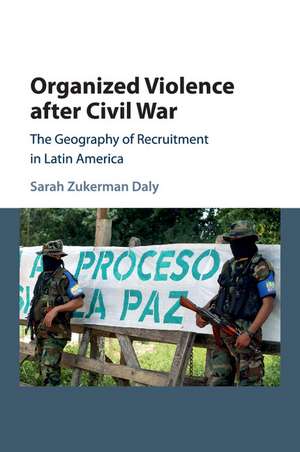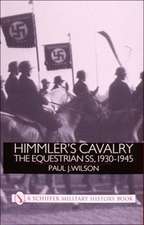Organized Violence after Civil War: The Geography of Recruitment in Latin America: Cambridge Studies in Comparative Politics
Autor Sarah Zukerman Dalyen Limba Engleză Paperback – 21 iun 2017
| Toate formatele și edițiile | Preț | Express |
|---|---|---|
| Paperback (1) | 289.95 lei 6-8 săpt. | |
| Cambridge University Press – 21 iun 2017 | 289.95 lei 6-8 săpt. | |
| Hardback (1) | 549.28 lei 6-8 săpt. | |
| Cambridge University Press – 4 feb 2016 | 549.28 lei 6-8 săpt. |
Din seria Cambridge Studies in Comparative Politics
-
 Preț: 233.13 lei
Preț: 233.13 lei -
 Preț: 267.61 lei
Preț: 267.61 lei -
 Preț: 239.36 lei
Preț: 239.36 lei -
 Preț: 185.64 lei
Preț: 185.64 lei -
 Preț: 160.82 lei
Preț: 160.82 lei -
 Preț: 206.52 lei
Preț: 206.52 lei - 9%
 Preț: 594.68 lei
Preț: 594.68 lei -
 Preț: 225.70 lei
Preț: 225.70 lei -
 Preț: 164.94 lei
Preț: 164.94 lei -
 Preț: 206.71 lei
Preț: 206.71 lei -
 Preț: 236.42 lei
Preț: 236.42 lei -
 Preț: 358.38 lei
Preț: 358.38 lei -
 Preț: 231.82 lei
Preț: 231.82 lei -
 Preț: 257.82 lei
Preț: 257.82 lei -
 Preț: 264.74 lei
Preț: 264.74 lei -
 Preț: 269.58 lei
Preț: 269.58 lei -
 Preț: 201.24 lei
Preț: 201.24 lei -
 Preț: 232.45 lei
Preț: 232.45 lei -
 Preț: 203.42 lei
Preț: 203.42 lei -
 Preț: 191.12 lei
Preț: 191.12 lei -
 Preț: 158.77 lei
Preț: 158.77 lei -
 Preț: 199.05 lei
Preț: 199.05 lei -
 Preț: 288.80 lei
Preț: 288.80 lei -
 Preț: 388.29 lei
Preț: 388.29 lei -
 Preț: 288.04 lei
Preț: 288.04 lei - 11%
 Preț: 695.06 lei
Preț: 695.06 lei - 11%
 Preț: 553.80 lei
Preț: 553.80 lei -
 Preț: 262.06 lei
Preț: 262.06 lei - 11%
 Preț: 691.66 lei
Preț: 691.66 lei -
 Preț: 228.00 lei
Preț: 228.00 lei -
 Preț: 385.28 lei
Preț: 385.28 lei -
 Preț: 312.89 lei
Preț: 312.89 lei -
 Preț: 224.44 lei
Preț: 224.44 lei -
 Preț: 287.07 lei
Preț: 287.07 lei -
 Preț: 251.27 lei
Preț: 251.27 lei -
 Preț: 313.70 lei
Preț: 313.70 lei -
 Preț: 277.38 lei
Preț: 277.38 lei -
 Preț: 423.79 lei
Preț: 423.79 lei - 11%
 Preț: 552.94 lei
Preț: 552.94 lei - 11%
 Preț: 554.43 lei
Preț: 554.43 lei - 14%
 Preț: 783.26 lei
Preț: 783.26 lei - 11%
 Preț: 584.04 lei
Preț: 584.04 lei -
 Preț: 228.60 lei
Preț: 228.60 lei
Preț: 289.95 lei
Nou
Puncte Express: 435
Preț estimativ în valută:
55.48€ • 60.46$ • 46.75£
55.48€ • 60.46$ • 46.75£
Carte tipărită la comandă
Livrare economică 23 aprilie-07 mai
Preluare comenzi: 021 569.72.76
Specificații
ISBN-13: 9781107566835
ISBN-10: 1107566835
Pagini: 344
Ilustrații: 16 b/w illus. 18 maps 27 tables
Dimensiuni: 150 x 230 x 25 mm
Greutate: 0.5 kg
Editura: Cambridge University Press
Colecția Cambridge University Press
Seria Cambridge Studies in Comparative Politics
Locul publicării:New York, United States
ISBN-10: 1107566835
Pagini: 344
Ilustrații: 16 b/w illus. 18 maps 27 tables
Dimensiuni: 150 x 230 x 25 mm
Greutate: 0.5 kg
Editura: Cambridge University Press
Colecția Cambridge University Press
Seria Cambridge Studies in Comparative Politics
Locul publicării:New York, United States
Cuprins
1. Introduction - a farewell to arms?; 2. Theory of the postwar trajectories of armed organizations; 3. Violence and peace in Colombia; 4. Geography of recruitment and postwar organizational capacity; 5. Strategic interactions between armed groups and remilitarization; 6. The path to demilitarization: configuration of local militias in Antioquia; 7. Remilitarization, strong and weak: local and non-local militias in Catatumbo and Urabá/Córdoba; 8. Beyond Colombia: transitions from war to peace in comparative perspective; 9. Conclusion.
Recenzii
'Sarah Zukerman Daly argues that organizational characteristics of armed groups in Colombia strongly affect whether they remilitarize after a peace agreement. Their extensive ties enable members of local groups to remilitarize, but members of non-local groups disperse and lose this capacity. Networks and geography are more important than access to weapons, which is almost universal. Daly's extraordinary fieldwork with extremely violent former group members provides convincing quantitative and qualitative support for this important argument. Organized Violence after Civil War is an extraordinary work of political science.' Robert O. Keohane, Woodrow Wilson School of Public and International Affairs, Princeton University
'This study provides a novel and thoughtful explanation of an important question for societies emerging from warfare - why do some groups silence their guns after agreeing to peace, while others remilitarize and return to violence? The argument highlights the role of the geography of recruitment - whether militant groups recruit and deploy fighters locally or from farther afield. The theory put forth is both parsimonious and subtle, and the empirical evidence adduced for it from the case of paramilitary groups in Colombia is extremely impressive. This book is certainly a must-read for any scholar of Colombia or any scholar of paramilitaries, but it will also find an important audience among scholars interested in the complicated dynamics of civil conflict and the behavior of non-state actors as they navigate the often stormy seas of postconflict transition.' Virginia Page Fortna, Columbia University, New York
'Organized Violence after Civil War explores why some - but not all - armed groups remilitarize after demobilization. Daly argues that the explanation lies in the geography of recruitment - whether the group recruited members from the locale where it was deployed - and in its strategic interaction with other groups after conflict's end. She shows that her theory accounts for why about half of Colombia's three dozen paramilitary groups remobilized, drawing on a wide range of data, from interviews with imprisoned leaders to surveys of demobilized combatants to unpublished government documents. This is an extraordinary achievement based on remarkable field research over several years.' Elisabeth Jean Wood, Yale University, Connecticut
'Civil wars have a strong tendency to recur, yet we know little about why. Drawing on a stunning array of data from extensive fieldwork in Colombia, Sarah Zukerman Daly shows that the geography of armed group recruitment explains why countries at peace slip back into violence. Groups that recruit locally remain cohesive after wars end whereas groups that recruit outside their own region wither away as their members depart. Regions comprised of locally based groups thus maintain a stable and peaceful balance of power, whereas regions where local groups neighbor non-local groups become unstable and prone to violence. Anyone seeking to understand the recurrence of violence after civil war should read this excellent book.' Alexander B. Downes, George Washington University, Washington DC
'Organized Violence after Civil War is a convincing book that is destined to be on the syllabus of virtually every graduate-level political science course on civil war and every reading list for related comprehensive exams. I hope that Daly will also distill her findings into a policy journal article for the general public and a short memorandum for policy makers beyond Colombia and the OAS; the book's relevance to crucial problems in international security reverberates far beyond the ivory tower.' Kimberly Marten, The Journal of Politics
'Ultimately, this work is a vital and engaging read for students and scholars of civil war, Colombia, and the behavior of violent organizations. Daly's vigorous, original research, clever application of theory, and innovative empirical insights represent a truly significant contribution to the field of political science and the study of intrastate conflict.' Danielle Gilbert, Terrorism and Political Violence
'A remarkable aspect of this book is the rigorous research design and thorough fieldwork that includes hundreds of interviews with former members and commanders of the paramilitary groups, national and regional institutions, civil society, and victims of those groups, among other sources. … Every scholar or policy-maker interested in the evolution of armed groups in contemporary armed conflicts should be aware of this book.' Mabel González Bustelo, Global Policy
'This study provides a novel and thoughtful explanation of an important question for societies emerging from warfare - why do some groups silence their guns after agreeing to peace, while others remilitarize and return to violence? The argument highlights the role of the geography of recruitment - whether militant groups recruit and deploy fighters locally or from farther afield. The theory put forth is both parsimonious and subtle, and the empirical evidence adduced for it from the case of paramilitary groups in Colombia is extremely impressive. This book is certainly a must-read for any scholar of Colombia or any scholar of paramilitaries, but it will also find an important audience among scholars interested in the complicated dynamics of civil conflict and the behavior of non-state actors as they navigate the often stormy seas of postconflict transition.' Virginia Page Fortna, Columbia University, New York
'Organized Violence after Civil War explores why some - but not all - armed groups remilitarize after demobilization. Daly argues that the explanation lies in the geography of recruitment - whether the group recruited members from the locale where it was deployed - and in its strategic interaction with other groups after conflict's end. She shows that her theory accounts for why about half of Colombia's three dozen paramilitary groups remobilized, drawing on a wide range of data, from interviews with imprisoned leaders to surveys of demobilized combatants to unpublished government documents. This is an extraordinary achievement based on remarkable field research over several years.' Elisabeth Jean Wood, Yale University, Connecticut
'Civil wars have a strong tendency to recur, yet we know little about why. Drawing on a stunning array of data from extensive fieldwork in Colombia, Sarah Zukerman Daly shows that the geography of armed group recruitment explains why countries at peace slip back into violence. Groups that recruit locally remain cohesive after wars end whereas groups that recruit outside their own region wither away as their members depart. Regions comprised of locally based groups thus maintain a stable and peaceful balance of power, whereas regions where local groups neighbor non-local groups become unstable and prone to violence. Anyone seeking to understand the recurrence of violence after civil war should read this excellent book.' Alexander B. Downes, George Washington University, Washington DC
'Organized Violence after Civil War is a convincing book that is destined to be on the syllabus of virtually every graduate-level political science course on civil war and every reading list for related comprehensive exams. I hope that Daly will also distill her findings into a policy journal article for the general public and a short memorandum for policy makers beyond Colombia and the OAS; the book's relevance to crucial problems in international security reverberates far beyond the ivory tower.' Kimberly Marten, The Journal of Politics
'Ultimately, this work is a vital and engaging read for students and scholars of civil war, Colombia, and the behavior of violent organizations. Daly's vigorous, original research, clever application of theory, and innovative empirical insights represent a truly significant contribution to the field of political science and the study of intrastate conflict.' Danielle Gilbert, Terrorism and Political Violence
'A remarkable aspect of this book is the rigorous research design and thorough fieldwork that includes hundreds of interviews with former members and commanders of the paramilitary groups, national and regional institutions, civil society, and victims of those groups, among other sources. … Every scholar or policy-maker interested in the evolution of armed groups in contemporary armed conflicts should be aware of this book.' Mabel González Bustelo, Global Policy
Notă biografică
Descriere
This book analyzes primary source evidence from militia groups, demonstrating the driving forces behind the post-war trajectory of armed groups.








